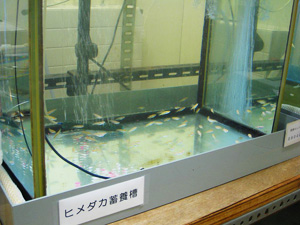GLP study compliant with Chemical Substance Control Law : CSCL
As GLP compliant institute we carry out Biodegradation test, Bioaccumulation test & Bioconcentration test, Partition coefficient measurement and Ecotoxicological effect test as per chemical substances control law. Further, we carry out Mammalian Toxicity, Developmental and Reproductive toxicity and Mutagenicity tests our associate laboratory according to safety and health law for purpose of prevention of health hazards in people handling chemicals.
For procedure of chemical control law examination, refer to Flow of tests according to chemical control law (Japanese).
This is a test to find out biodegradability. Chemicals are exposed to microorganisms for a fixed period and degradation is measured. In report of chemicals control law test, if the chemical is judged as having good degradability then there is no need for further testing. (Refer to flow of tests according to chemical control law).
This test is carried out by Coulometer. If structural variants are created then isolation, quantitative and structure estimation of decomposed substance is carried out.
Bioaccumulation & Bioconcentration test
This test is carried out to find out bio-accumulation of chemicals. Fish such as Carp is kept for 28 days in a water tank, where fixed concentration of chemical is maintained. By measuring concentration of chemical in vivo, bio-concentration factor (BCF) is determined. A substance is considered to be not bio-accumulative, if it has a BCF less than 1000 times, bio-accumulative or not depends on the result of excretion test and different parts test if it has a BCF from 1000–5000 times and very bio-accumulative if it has a BCF greater than 5,000 times.
Partition coefficient (Log Po/w) measurement
It is measured by Shake flask method and HPLC method. In Po/w test of compound in water and 1-octanol, proportion of solute concentration in water layer to concentration of solute in octanol layer is expressed. If common log Po/w of chemical is less than 3.5 then it is taken as not having high bio concentration.
Ecotoxicity study (Animal/plant toxicity test) (CSCL GLP compliance is confirmed on 30/4/2009.)
Fish acute toxicity test
Impact of chemicals towards fish is evaluated by 96 hour exposure.
Daphnia magna acute immobilization test (Daphnia magna)
Impact of chemicals towards Daphnia is evaluated by 48 hours exposure.
Algal growth inhibition test (Pseudokirchneriella subcupitata)
Impact of chemical substance on growth of algae is evaluated by exposure for 72 hours.
Toxicity study
Mutagenecity test using microorganisms (Ames test)
Chromosomal disorder test/Neurovirulence test
28 days repeated dose toxicity test
Impact on beneficial organisms other than aquatic animals and plants
CSCL test, Registration application
Our company helps in test reports and consultation for manufacture and imports of new chemical substances (Ministry of health, labour and welfare, Ministry of Economy, Trade and Industry, Ministry of environment) and for notification on Industrial safety and Health act and CSCL, outsourcing etc. Contact us for further information.
GLP study compliant with Agricultural Chemicals Regulation Law : ACRL
Properties, stability, degradability, etc. on active ingredients
- Physical-chemical properties tests:
Boiling point, Melting point, Thermal stability, pKa,Hydrolysis, Partition coefficient, Water solubility, Solubility in organic solvents, Absorption/desorption , Spectra(UV, IR, MS), Density, Bioconcentration & Bioaccumulation test, Color, Physical form, Odor.
- Quantitative analysis:
5 batch analysis, Purity
Impact on beneficial organisms other than aquatic animals and plants (Ecotoxicity study)
Algal growth inhibition test (72 hours)
Daphnia magna acute immobilization test (48 hours)
Daphnia magna reproduction test
Fish acute toxicity test (96 hours)

In addition we carry out pesticide formulation analysis, residue analysis and general analysis.
